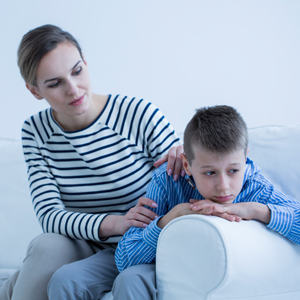Managing Kids with ADHD—and Managing Yourself—in the COVID-19 Era
Stephen P. Hinshaw, PhD
Professor of Psychology, UC Berkeley,
Vice Chair for Child and Adolescent Psychology and Professor of Psychiatry,
UC San Francisco
 You’re a parent, juggling work at home (that is, if you still have a job)…with concern over finances and worries about the future… while home-schooling your kids. But what if, at the same time, your child or teen is contending with ADHD?
You’re a parent, juggling work at home (that is, if you still have a job)…with concern over finances and worries about the future… while home-schooling your kids. But what if, at the same time, your child or teen is contending with ADHD?
These are not easy times, for sure, especially if you’re a parent of a youth with behavioral challenges. Amidst a deluge of information that we’re all experiencing these days, I’ll try to briefly highlight some suggestions and guidelines from experts in the ADHD field.
First and foremost, it’s essential that you manage yourself and your own expectations. Kitchen tables cannot be transformed into school classrooms quickly or easily. Juggling work commitments with the daily, hour-after-hour journey of keeping your offspring entertained and busy (and learning!) is a formidable challenge. But you won’t be able to do any of these things well unless you’re striving to maintain a positive, future-oriented attitude yourself. As all parents know, kids are experts at reading and trying to interpret any emotions their parents are experiencing. In short, it’s nearly impossible to hide a sense of panic or despair.
My colleague Dr. Jay Wagener, of Pasadena, has written a great series of posts in Thrive Global since the start of the pandemic. One of my favorites is titled “The New Ab-Normal”:
https://thriveglobal.com/stories/the-new-ab-normal/

In it, he reminds us of four essential P’s: positive reframing, patience, planning, and prevail. Working to keep positive while the world has radically changed is not an exercise in being Pollyanna or denying tough realities. In fact,
finding faith that we can and will emerge and thrive actually propels a self-fulfilling prophecy of shifting one’s brain functioning to support resilience.
In addition, given the strongly heritable nature of ADHD, many biological parents of youth with ADHD exhibit a number of the same symptoms (whether or not diagnosed), including lack of organization, difficulty controlling impulses, short temper, and the like. Now that many more hours are spent in the company of kids with similar tendencies, it’s important to remember some key points from basic learning theory. That is, build expectations for yourself (as well as your child/teen) in small steps–Rome was not built in a day. Reward yourself for incremental successes (just as you reward your offspring). Try not to fight fire with fire but find ways to de-escalate—without at the same time, caving in or giving in).
Second, what about managing ADHD at home—and in a distance learning or home-schooling environment? My colleague and long-time ADHD expert Russell Barkley, courtesy of his publisher, Guilford Press, has made available five crucial tips, based on evidence related to working with ADHD in non-COVID times. I am repeating his crucial five points here, editing and adapting his language.
(i) Make time to move. Physical exercise, especially when aerobic, is evidence-based for for ADHD. When possible, try to get outside and move every day. It’s great to incorporate “exercise breaks” when you can: 20 jumping jacks, 10 pushups, running 5 laps around the outside of the house—even a quick dance party in the living room.
(ii) Alternate fun and less-fun activities (i.e., high-appeal vs. lows-appeal). Youth with ADHD tend do better at more tedious tasks if these are alternated with burst of fun, highly appealing activities. So, rather than have home “school” last for hours on end, intersperse it with activities kids enjoy (e.g., build a fort, bake cookies, go on a scavenger hunt inside or outside, play a favorite game). For teens, of course, there are distinct challenges here—so many adolescents crave being with their peers. Setting realistic expectations for social media use (maybe the only means of keeping contact) during these times is a challenge for adults everywhere.
3. Prevent over-stress. When more than one parent is in the home, try to alternate child supervision, so that each parent gets a break every day. And cater to your strengths. Who has more energy and patience in the mornings? Is one of you an art lover while the other is better at teaching math? Alternating roles can prevent burnout, stress, and fatigue. For single-parent families, try as best as you can to carve out time for yourself. Perhaps a grandparent or trusted friend can “babysit” over FaceTime or Zoom for a time.
4. Be consistent with medication. Even though many schools have cancelled in-school attendance for the rest of the academic year, ADHD medications are useful for improving ADHD and reducing risks outside of school just as much as in the actual classroom.
5. Use home reward programs. When activities are fun (like a video game), kids will stick with them because they contains their own reward. But for school work, persistent effort is a major challenge. External rewards are evidence-based for kids with ADHD, to sustain motivation. You can set up a token system with fun “prizes”—ice cream, special time with a parent, extra time for a video game, or a self-chosen one (within reason).
Third, ADHD expert Laura Knouse has created a mini-series of YouTube videos featuring more extended discussion (though each is only 12-13 minutes long) on self-regulation at home:
Step 1: Set Daily Goals: https://youtu.be/bZzi9vsppao
Step 2: Build in Consequences: https://youtu.be/tTowT1mr-ZY
Step 3: Actively Manage Distractions: https://youtu.be/xerEo4yrDY4
I find these to be clear and compelling.
Finally, we can’t ignore that sheltering in place can be a trigger, in vulnerable families, for intimate partner violence and child maltreatment. The federal Substance Abuse and Mental Health Services Administration (SAMHSA) recently posted an important piece on risks for these tragic occurrences, magnified during the COVID-19 era:
https://www.samhsa.gov/sites/default/files/social-distancing-domestic-violence.pdf
In the end, stay positive, strive for resilience, and keep letting your offspring know how much you notice their adaptability and spark during this unprecedented time.
